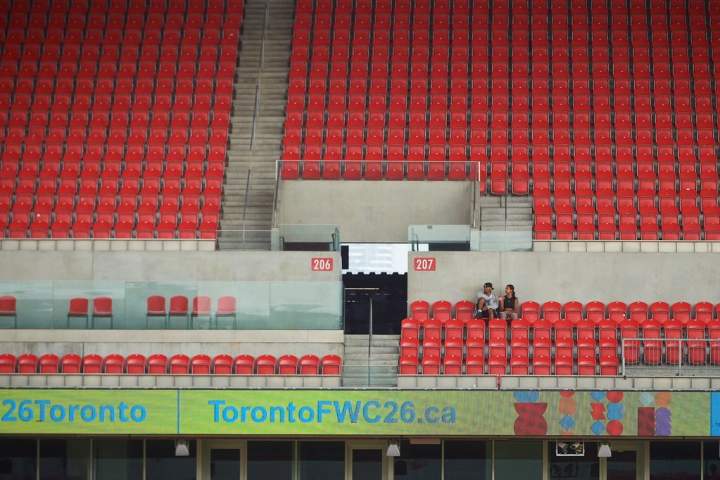Health
Toronto Launches Wastewater Surveillance Program for FIFA World Cup

Toronto is set to implement a wastewater surveillance program aimed at detecting the spread of diseases during the FIFA World Cup, which is scheduled to commence in June 2024. The initiative, spearheaded by **Toronto Public Health**, will involve the collection of sewage samples from areas where large crowds of fans gather. The program will test these samples for various pathogens, including **COVID-19**, **influenza**, and **respiratory syncytial virus (RSV)**.
Dr. Michelle Murti, the new Medical Officer of Health in Toronto, emphasized the importance of this pilot program in enhancing public health safety during the event. She noted that due to the anticipated influx of an estimated **300,000 out-of-town visitors** for the six World Cup matches, monitoring wastewater could provide valuable insights into the health landscape of crowded areas. “It’ll just be one more piece of information that we have as part of a larger suite of information that we’re looking at to make sure that we’re keeping people safe and healthy through the games,” Dr. Murti explained.
Innovative Approach to Public Health
The approach draws on lessons learned from **Ontario’s COVID-19 wastewater surveillance program**, which offered near real-time data on virus prevalence before its conclusion last year. **Dr. Fahad Razak**, an internal medicine specialist at **St. Michael’s Hospital**, praised the decision to apply this technology on a large scale during such a significant international event. He expressed concern that the benefits of the previous program should have been extended beyond monitoring COVID-19.
For instance, earlier this year, **Windsor-Essex County** utilized wastewater surveillance to identify a rise in **measles** infections, highlighting the potential of this technology to detect a range of communicable diseases. “Measles is a very good example because it is an illness that is so transmissible. If you have a high pocket of unprotected people and you have the emergence of the measles signal within that area, that’s an area where you’d want to do your best from a public health perspective to try and prevent spread,” Dr. Razak noted.
Additionally, he pointed out that wastewater analysis could also serve as a tool for monitoring the opioid crisis, allowing officials to detect contaminated drug supplies during the World Cup. “The idea here is – can you use it to make decisions and to intervene in a way that saves people’s lives or reduces illness? That’s the critical question,” he stated.
Limitations and Future Prospects
Despite the advantages of this targeted program, concerns about its limited reach were raised by **Dr. Lawrence Goodridge**, co-lead of the **Guelph Wastewater Epidemiology Lab for Public Health**. He noted that the provincial government’s decision to end its comprehensive wastewater monitoring program, which tracked **75 percent of the population**, has necessitated smaller-scale initiatives like the one in Toronto.
The pilot program will be particularly valuable in the event of a major outbreak during the games, but Dr. Goodridge cautioned that the mobility of fans throughout the province could diminish its effectiveness. “People are going to be moving around; they’re coming into Toronto, but they’re also going to be moving around through the province for the World Cup,” he explained.
Ultimately, Toronto’s initiative aims to enhance public health measures for future large-scale events. The pilot will serve as a crucial test for the efficacy of wastewater surveillance in safeguarding public health during significant gatherings.
-

 Education3 months ago
Education3 months agoBrandon University’s Failed $5 Million Project Sparks Oversight Review
-

 Science4 months ago
Science4 months agoMicrosoft Confirms U.S. Law Overrules Canadian Data Sovereignty
-

 Lifestyle3 months ago
Lifestyle3 months agoWinnipeg Celebrates Culinary Creativity During Le Burger Week 2025
-

 Health4 months ago
Health4 months agoMontreal’s Groupe Marcelle Leads Canadian Cosmetic Industry Growth
-

 Technology3 months ago
Technology3 months agoDragon Ball: Sparking! Zero Launching on Switch and Switch 2 This November
-

 Science4 months ago
Science4 months agoTech Innovator Amandipp Singh Transforms Hiring for Disabled
-

 Education3 months ago
Education3 months agoRed River College Launches New Programs to Address Industry Needs
-

 Technology4 months ago
Technology4 months agoGoogle Pixel 10 Pro Fold Specs Unveiled Ahead of Launch
-

 Business3 months ago
Business3 months agoRocket Lab Reports Strong Q2 2025 Revenue Growth and Future Plans
-

 Technology2 months ago
Technology2 months agoDiscord Faces Serious Security Breach Affecting Millions
-

 Education3 months ago
Education3 months agoAlberta Teachers’ Strike: Potential Impacts on Students and Families
-

 Science3 months ago
Science3 months agoChina’s Wukong Spacesuit Sets New Standard for AI in Space
-

 Education3 months ago
Education3 months agoNew SĆIȺNEW̱ SṮEȽIṮḴEȽ Elementary Opens in Langford for 2025/2026 Year
-

 Business4 months ago
Business4 months agoNew Estimates Reveal ChatGPT-5 Energy Use Could Soar
-

 Technology4 months ago
Technology4 months agoWorld of Warcraft Players Buzz Over 19-Quest Bee Challenge
-

 Business3 months ago
Business3 months agoDawson City Residents Rally Around Buy Canadian Movement
-

 Technology2 months ago
Technology2 months agoHuawei MatePad 12X Redefines Tablet Experience for Professionals
-

 Business3 months ago
Business3 months agoBNA Brewing to Open New Bowling Alley in Downtown Penticton
-

 Technology4 months ago
Technology4 months agoFuture Entertainment Launches DDoD with Gameplay Trailer Showcase
-

 Technology4 months ago
Technology4 months agoGlobal Launch of Ragnarok M: Classic Set for September 3, 2025
-

 Technology4 months ago
Technology4 months agoInnovative 140W GaN Travel Adapter Combines Power and Convenience
-

 Science4 months ago
Science4 months agoXi Labs Innovates with New AI Operating System Set for 2025 Launch
-

 Top Stories2 months ago
Top Stories2 months agoBlue Jays Shift José Berríos to Bullpen Ahead of Playoffs
-

 Technology4 months ago
Technology4 months agoNew IDR01 Smart Ring Offers Advanced Sports Tracking for $169










